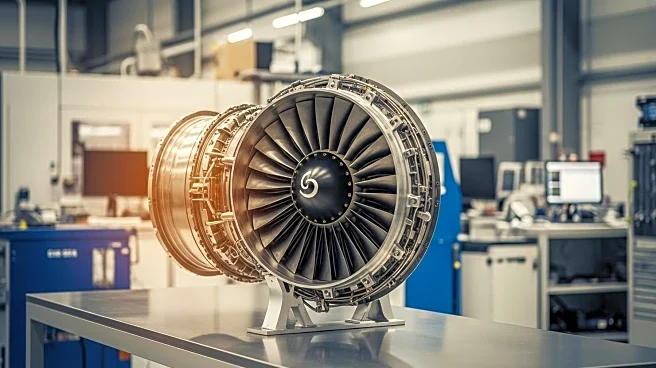What's Happening?
Rolls-Royce is progressing with durability improvements for its Trent 1000 engines at a newly opened facility in Derby, England. This facility, part of the company's headquarters, is dedicated to quick-turn engine services and the first durability enhancement package for the Trent 1000, which powers Boeing 787 aircraft. The enhancements aim to address durability issues, particularly with high-pressure turbine blades, by increasing cooling airflow and updating combustion systems. The facility has recruited over 100 staff to support these modifications, which are expected to double the time on wing compared to current standards.
Why It's Important?
The durability enhancements for the Trent 1000 are crucial for Rolls-Royce as they aim to improve engine reliability and performance, which directly impacts airline operations and maintenance costs. By increasing the time on wing, airlines can reduce downtime and maintenance expenses, enhancing operational efficiency. This development also strengthens Rolls-Royce's competitive position in the aerospace industry, particularly against GE Aerospace's GEnx engines. The investment in the Derby facility and recruitment efforts reflect Rolls-Royce's commitment to addressing past durability issues and improving customer satisfaction.
What's Next?
Rolls-Royce plans to unveil phase two of the durability enhancement package next year, targeting a further 30% improvement in time on wing for the Trent 1000. This phase will include additional upgrades to high-pressure turbine blades and other engine components. The company is also preparing for potential supply chain constraints by stockpiling certified components. Continued recruitment and investment in facilities like Derby and Dahlewitz will support these efforts, ensuring the company can meet demand and deliver enhanced engines to its customers.
Beyond the Headlines
The enhancements to the Trent 1000 engines not only improve performance but also reflect broader trends in the aerospace industry towards sustainability and efficiency. By reducing maintenance needs and improving engine longevity, Rolls-Royce contributes to more sustainable airline operations. Additionally, the investment in workforce development and facility upgrades highlights the importance of skilled labor and advanced technology in maintaining competitive advantage in the aerospace sector.











